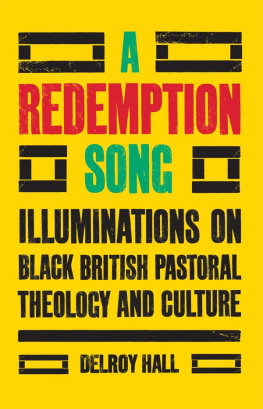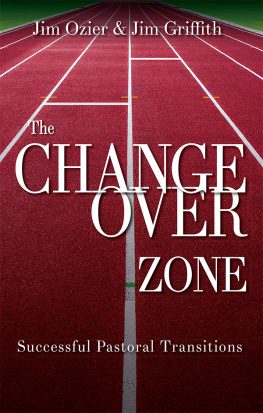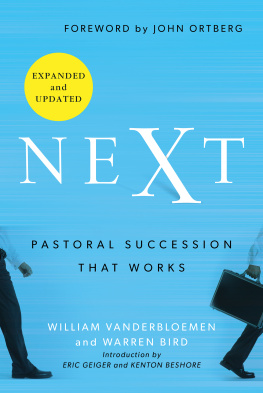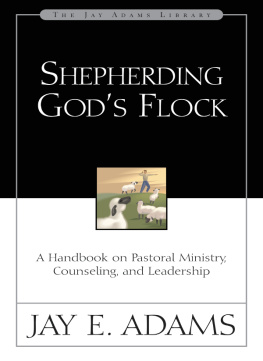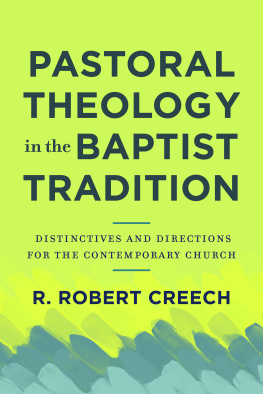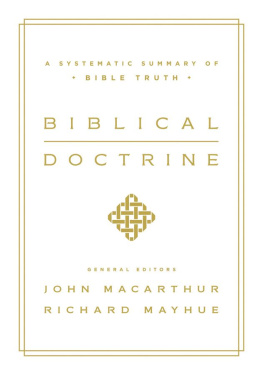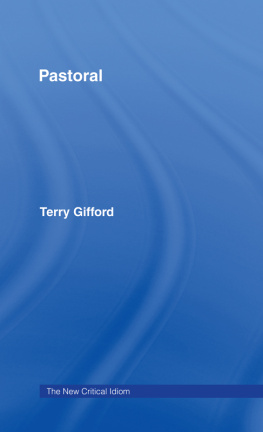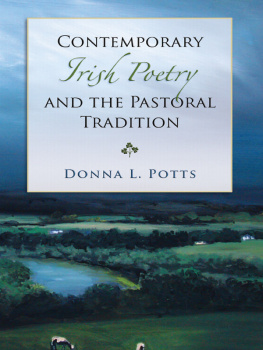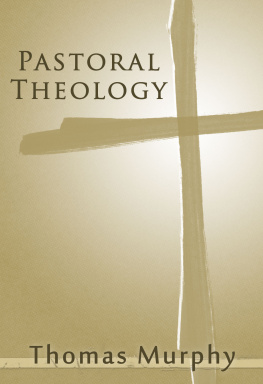A Redemption Song
Illuminations on Black British Pastoral Theology
Delroy Hall
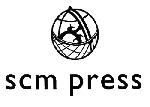
Delroy Hall 2021
Published in 2021 by SCM Press
Editorial office
3rd Floor, Invicta House,
108114 Golden Lane,
London EC1Y 0TG, UK
www.scmpress.co.uk
SCM Press is an imprint of Hymns Ancient & Modern Ltd (a registered charity)

Hymns Ancient & Modern is a registered trademark of Hymns Ancient & Modern Ltd
13A Hellesdon Park Road, Norwich,
Norfolk NR6 5DR, UK
All rights reserved. No part of this publication may be reproduced, stored in a retrieval system, or transmitted, in any form or by any means, electronic, mechanical, photocopying or otherwise, without the prior permission of the publisher, SCM Press.
The Author has asserted his right under the Copyright, Designs and Patents Act 1988 to be identified as the Author of this Work
Bible extracts are from the following versions:
Authorized Version of the Bible (The King James Bible), the rights in which are vested in the Crown, reproduced by permission of the Crowns Patentee, Cambridge University Press.
New King James Version Copyright 1982 by Thomas Nelson.
New International Version. Copyright 1973, 1978, 1984, 2011 by Biblica, Inc. Used by permission of Zondervan. All rights to be reserved worldwide.
British Library Cataloguing in Publication data
A catalogue record for this book is available
from the British Library
ISBN 978-0-334-06072-7
Typeset by Regent Typesetting
Printed and bound by
CPI Group (UK) Ltd
Contents
Acknowledgements
As is often said, books are never the effort of only one person. The contributions from a myriad of people have knowingly and unknowingly been part of the development of this publication.
I must acknowledge the ambition and love of my parents: my mother Dorothy, who remains fiercely independent at the age of 86, and my father Lindo, who passed away over 30 years ago at the young age of 52. They met here in the UK, having travelled from the Caribbean in the early fifties, and married in 1957 in Newark, Nottingham. I did not realize at the time that they were both bright, sharp and ambitious people who did not have the privilege of much education beyond school in Jamaica.
In his late twenties, my father was ready to relocate to Canada, where builders joiners were needed for the construction industry. Through a series of events, my parents changed their minds and headed for Leicester, where I remained until 1996.
I must also thank fellow sojourners along my academic pathway. Delroy Reid Salmon, who now as best friend has given intellectual encouragement and been a challenger to academic and ministerial development.
Thanks go to Eric Williams, fellow academic warrior who, along with his gift of finding excellent places to eat, is seriously sharp at creating and finding catchy titles for pieces of writing.
I must also thank, albeit posthumously, the late Caroline Redfern and Lynnette Mullings, who were developing scholars during their time at the University of Birmingham as they worked through their doctoral studies. Sadly both succumbed to the dreaded pang of cancer literally days away from submission and never completed their theses. Had they submitted their theses, passed their vivas and published, they would have made necessary and substantial dents in the area of Black theology, sexuality and womanist perspectives within the Black Majority Church on the UK landscape. Black Majority Church is where the ethnic majority membership of the church is black, rather than the leadership.
A latecomer to my academic life, with a recommendation from Eric Williams, is Fred Ware, Associate Dean for Academic Affairs at Howard University School of Divinity. Being unsure how to lay out the various chapters for this book, I emailed him for help and he suggested I send him the chapter outlines. We met at Howard University and his suggested layout for these apparently odd writing projects was creative, gave clear structure and helped me value and appreciate the work I had written.
The person who has challenged me the most to write and been a constant loving flea in my ear has been Anthony Reddie, who has unselfishly offered support, encouragement and time to the book. Already he is prodding me in the direction of a second book. A challenge I have already taken on board.
One person I cannot forget is Inderjit Bhogle, who, through eons of me asking how to do theological reflections, has taught me a method that has stayed with me ever since. Thank you.
I cannot forget my sister Sandra, who with a sharp mind has always been a supporter of my development. The final supports to my writing development are my wife Paulette and my twin daughters Saffron and Jordan, who would not take it too lightly if I introduced them as my girls as they are now women in their mid-twenties and have their own opinions and thoughts about things.
I have enjoyed reading, re-working and editing each chapter. I hope you too will enjoy reading it while asking critical questions which will only serve to improve what has been written.
Introduction
Fifty years after first wanting to write a book, here it is. My desire to write a book, or books even, began as a 14 year old who loved composition, as it was called in those days. Using ones creative imagination to write a story. After having a story read in class by the English teacher and having two short stories published in the school newsletter, I wanted to write thriller novels, but I did not know the process of writing a book. After six years of repeatedly trying, I quit. Not only did I not know how to write a book, I also concluded that Black people never wrote books, so what was the point? I now know that my earlier conclusions were untrue and I now know that books are written one word, one sentence, one paragraph, one section and one chapter at a time with structure and a plan of sorts.
What follows are my intellectual and pastoral musings on the life and plight of my African ancestors, who were enslaved during the transatlantic slave trade, and the Windrush generation and their subsequent offspring in the UK. At the time of writing these various articles, I had not envisaged that they would form a collection leading to a seminal text on a Black British pastoral theology.
Chapter 1 captures my reflections on how I position myself as a Black man in Britain and on being perceived by others as a problem. I am one of few Black male Caribbean counsellors in the UK. Furthermore, this chapter positions me as a Black human being, a Christian pastor, trainer and trained psychotherapist who happens to be born in England and initially was oblivious to the history surrounding my cultural heritage. While my life journey is unique, as are all our lifes journeys, it also mirrors that of countless African Caribbean people born in the UK, the mother country, during the late 1950s and 1960s. I was born here and this is where I call home, sort of. I am meant to be a part of British society, but I stand out visibly and I am reminded daily that I am different. Despite standing out and being a target for discrimination, Black people remain resilient. At times, against the odds.
Chapter 2 provides the historical context of how Africans arrived in the Americas. There is a commonly-held view that all Black people are the same. That is, Africans and African Caribbeans are all one and the same. This is due to immense societal pressure for homogeneity and assimilation. For me, the crucial distinction between continental Africans and African Caribbean people is the horrendous journey from Africa to the Americas called the Middle Passage. This terrifying and miserable sojourn was the transportation of human cargo from Africa to the Americas and was the middle leg of trade. The first leg of the journey carried material possessions from the UK to be traded for African slaves. The final part of the journey was ships laden with sugar, cotton and tobacco, lucrative bounty fortifying Britains Industrial Revolution. It must be emphasized: the Africans did not apply for jobs to relocate to the Americas. Neither were they on holiday or on secondment. They were enslaved and, in becoming so, they were deprived of everything imaginable about their identity and their humanity into being nobodies. In sociological terms they were objectified, in a business sense they were commodified as chattels for insurance purposes; and in a human sense they were dehumanized. The Middle Passage is seen through the lens of the Easter story of Crucifixion, Holy Saturday and Resurrection. Needless to say, this was a trek of existential consequence.
Next page
